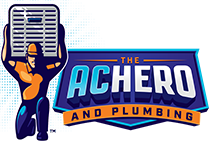A heat pump transports heat in a central heating and cooling system. It is commonly used in climates with moderate winters and summers. Rather than creating heat, the pump transports warm air from one place to another, whether it is to deliver heat into your home or move it outside when the weather is hot. The system can reverse direction and perform very much like an air conditioner in the summer.
How a Heat Pump Works
Like other HVAC systems, heat pumps use refrigerant that absorbs heat. The fluid circulates throughout the system, generally between an outdoor compressor and indoor fan coil, which is contained in an air handler. This device looks much like an air conditioner. A heat pump can operate in cooling mode, in which heat is absorbed from indoor air and released into the air or underground. It runs in reverse in heating mode to absorb heat from the environment and deliver it indoors.
Changing the operating mode is as simple as flipping a switch.
How Does a Heat Pump Differ from an Air Conditioner or Furnace?
Heat pumps have many of the same features as ACs. However, an air conditioner cannot heat your home unless it is paired with a furnace. But a heat pump does provide the same comfort level and efficiency. It pressurizes refrigerant with a compressor, while a reversing valve allows the refrigerant to change direction (this is what allows you to shift the pump from heating to cooling mode, and vice versa). Compared to a furnace, which burns fuel to produce heat, a heat pump uses electricity to physically move heat while releasing zero harmful emissions in the process.
Heat Pumps and Energy Efficiency
Heat pumps can cut the electricity you use for heating in half. Modern heating/cooling systems must have a Seasonal Energy Efficiency Ratio, or SEER, of at least 14. A high-efficiency heat pump may have a SEER rating of as high as 20.
Features such as 2-stage compressors, multi-stage operation, and variable speed motors increase energy efficiency even more. Modern heat pumps can therefore operate at different speeds depending on the load, rather than only run at full speed or be turned off. Variable speed technology conserves power and enables equipment to last longer thanks to reduced wear.
Types of Heat Pumps
Common types include air source heat pumps, which are relatively inexpensive and use the air surrounding your home for heat exchange. Water source heat pumps dissipate heat into water, which may be in a well or lake. These are less common, while ground source, or geothermal, heat pumps deliver heat from underground (via horizontal or vertical pipework), where the ambient temperature is constant. Installation can be complicated and expensive but these pumps are highly efficient.
As the technology has advanced, hybrid heat pumps have emerged. These either combine ground and air source units or heat pumps and gas/oil powered boilers. There are also solar heat pumps that use solar panels for power and to heat or cool your home.
Contact The AC Hero for Heat Pump Information, Installation, and Repair
Our highly skilled technicians are familiar with all types, sizes, and brands of heat pumps. They can advise you on the best system for your home. Available 24/7, our team can keep your heat pump running as reliably and efficiently as it was designed to. Free consultations are available, and we offer financing and an unbeatable Maintenance Plan. Schedule an appointment online or call 817-587-0876 today.
